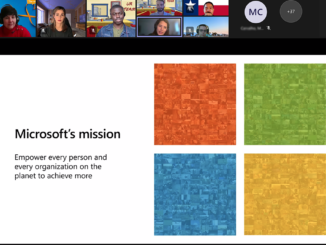
Leadership 4.0 is the answer to Industry 4.0. To some, it is a threat. To others, an opportunity. Is the next industrial revolution ahead?
According to experience and for logical reasons, every industrial revolution will first produce many unemployed persons. A high degree of technization requires fewer and fewer workers on the labor market, though they need to meet increasing qualification demands! On the other hand, new professions and industries are developed with more demanding work, along with areas in which people are replaced for reasons of safety, due to higher precision or reduction of routine work (Economist, 2016). For example, distance sensors can influence driving characteristics directly and indirectly, which minimizes collisions (of trucks) in particular. Neurosurgical minimally invasive operations can hardly be completed by humans and rely on a software coupled to the surgeon that submits the instructions to a mechanical robot, where they will be executed with the greatest accuracy. Work that used to be boring, tedious, slow and demotivating can be taken over by systems as well.
Leadership 4.0 and Industry 4.0
What is Leadership 4.0 precisely, in contrast to conventional leadership types? In future, an organization will have to prepare strategically and operationally for the pending structural change of the industry at the overall organizational level (macro leadership) as well as personnel management and training (micro leadership). This article will mostly focus on micro leadership, i.e. the actual implementation of a management change on the staff level. This is a paradigm shift in the area of personnel management. However, this cannot be done without considering the overall organizational management with values, culture and structural as well as system-side changes of the overall organization. This will mostly not be done by personal communication and physical presence, but in virtual organization forms (Duarte and Snyder 2001): For example, there may be a virtual team made up of several specialists who work on a shared project independently of each other.
The ITC Model (Internationalization-Technologization-Customization)
The greatest dynamics of the global economy and society are the extremely fast internationalization and technologization. A strongly growing global population that wants to have access to the same wealth and resources is the driving force behind internationalization. The theoretical access to and actual availability of products (goods [trade]) around the world to places (transport) and people (communication) is possible (Albrecht, 2016). Goods and communication flows can be accelerated by better coordination in the systems. If these systems communicate with each other, people need to take much less care of the activation and review of whether, how and at what quality an action is performed. It seems plausible, and the system “Industry 4.0” appears to be understood. However, there is another important component that results from this rising spiral: a higher degree of customization. The more similar all people grow, the more they want to differentiate or stand out from the others.
Paradoxically, people want to copy certain trends at the same time to feel like they belong, while on the other hand wishing to show that they are unique. These needs can be met even better by self-controlling systems in future, since they are better able to record the customer profile through data volume and quality. For large organizations, it must be noted that customers are not only external consumers, but also internal employees! Does this mean that management becomes irrelevant and that the classical B2C (Business to Customer) is being replaced by M2C (Machine to Customer) because the interfaces are perfectly covered by M2M (Machine to Machine)?
One could take this even further and stipulate the thesis that complete management by machines would be desirable if machines were able to control systems and groups objectively and reliably, like managers?
Machines would, first of all, be a lot more objective regarding
- Decision-making: Decisions would be made based on a greater available data volume and would be made balanced.
- Employee performance reviews: The employees would be evaluated based on facts rather than subjective experience and bias or even prejudice.
- Adjusting by indices: Indices would be reviewed continually and used for objective decisions subject to more accurate assessment.
The benefits cannot be disregarded. However, we are still a few years away from the point where machines will be able to act completely empathically! It has turned out that the personal contact, conversation, the informal exchange of ideas is essential to build trust. This is where an increase will be necessary in future in light of Industry 4.0, since most teams act virtually, which makes it harder to build trust in them (Sarker, 2011).

New Competence Profile for Leadership 4.0
What do we expect of our managers and team members in Leadership 4.0?
Managers as well as team members require
- Technically excellent trainings and continuous subsequent trainings, especially in the database area and in IT applications, to maintain the desired standard.
- Excellent management and communication skills. Situation-related management of culturally different employee types, which cannot be ensured due to the respective personality profile, must be done by a colleague or team member (Shared Leadership).
- Extremely good handling of employees, but in particular also of external suppliers, partners and customers. Especially in complaint management (complaint/ customer service management), technical experts are needed more and more often to provide information and develop solutions together with the customer.
- Anchoring in a person who is very familiar with the content (mentor) and an empathy-promoting partner (Business Coach)
- Extremely high adaptability and flexibility, both in content and related to specific projects; this can only be achieved by repeated training and exchange of lessons learned.
All in all, not only are graduates expected to show high technical know-how, but the willingness of employees to educate themselves further throughout their lives is demanded as well. Technical expertise will become just as relevant as leadership quality. Leadership 4.0 calls the HR staff to think about revoking the previously favored separation of the career paths of technical, project, management/ leadership careers in future and to combine them.
The Leadership 4.0 Dream Candidate
The dream candidate for Leadership 4.0 in virtual organization forms looks as follows: he is very well trained technically and has dealt with complex systems in theory and practice during his studies already. Ideally, he will continually expand his knowledge by (exchange of) experience and further training, and has high management competence that he does not necessarily execute directly but that he may delegate.
A more strongly connected career world requires new leadership forms and qualities. Additionally, a new infrastructure will be mandatory, in which managers and teams can act virtually. Organizations in the traditional sense, i.e. employees who are physically represented by their presence will become rare. A shared understanding and identification with the corporate culture or a product/ project will become all the more important. Only this can ensure employee loyalty.
In order to put Leadership 4.0 into practice, politics, universities and industry must promote the expected competences and develop suitable training as well as further training concepts for this.
Excerpts with kind permission of Hanser Verlag from: Albrecht, A. (2016), Leadership 4.0, in: Digital vernetzt, Jung H.H. and Kraft, P. (Eds.), Hanser Verlag.
Sources:
- Albrecht, A.: Internationales Management, Berliner Wissenschafts-Verlag, Berlin, 2016
- Duarte, D.L.; Snyder, N.T.: Mastering virtual teams, 2nd ed., San Francisco, 2001
- Economist: The Return of the Machinery Question. In: Special report: Artificial Intelligence, The Economist, 25 JUN 2016, 3-16, 2016
- Sarker S.; Ajuja M.; Kirkeby S.: The role of communication and trust in global virtual teams: A social network perspective, in: Journal of Management Information Systems, 28 (1), 273–309, 2011




